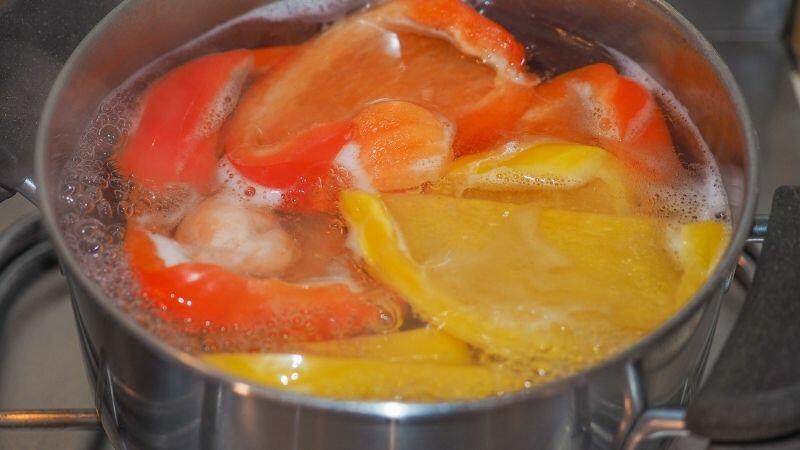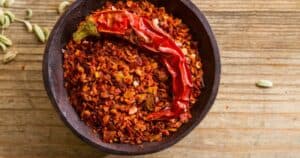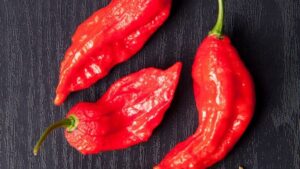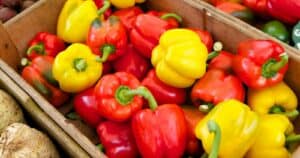If you love spicy cuisine, you may wonder, “Does cooking hot peppers like jalapeños and habaneros reduce their spicy kick?” The answer isn’t so simple!
While boiling or steaming hot peppers can significantly tame their heat, other cooking methods like roasting, sautéing, or pickling can actually make them even spicier.
In this article, you’ll discover:
- How capsaicin causes hot peppers’ fiery burn
- Cooking techniques that reduce spiciness
- Methods that intensify heat and
spice - Tips for controlling pepper heat in your kitchen
Understand how different preparation impacts hotness levels so you can master the flames and fine-tune
Why Hot Peppers Taste Spicy
Before looking at how cooking influences heat, let’s review why peppers burn in the first place.
The spicy sensation comes from capsaicin, an alkaloid concentrated mainly in the ribs and seeds. When you eat a hot pepper, capsaicin binds to receptors that sense heat and pain, tricking your brain into thinking you’ve burned your mouth.
More capsaicin = more
Now let’s see how cooking affects those fiery capsaicin molecules.
Boiling Hot Peppers in Water Reduces Spiciness
If you boil hot peppers like jalapeños, habaneros, or ghost peppers in water, it significantly decreases their heat. Why does this happen?
- Capsaicin is released into the surrounding water
- Prolonged boiling breaks down capsaicin
- More subtle flavors emerge
The longer you boil, the more the capsaicin escapes and deteriorates, leaving you with a milder pepper.
However, boiling peppers in a sauce, stew or soup makes the whole dish taste hotter as the capsaicin disperses and doesn’t dissipate.
Which Cooking Techniques Reduce Heat the Most?
While various cooking methods can temper the
Boiling/Simmering in Water
Boiling hot peppers in plain water is the most effective way to lower their heat. The bubbling liquid draws out and breaks down a high amount of capsaicin as it permeates the pepper’s flesh. Simmering has a similar but less intense effect.
Steaming
Exposing peppers to moist steam causes their pores to open, allowing volatile oils containing capsaicin to escape at a rapid rate. The constant contact with hot vapor pulls spicy compounds out of the pepper’s skin and seeds.
Roasting/Baking
Dry roasting or baking peppers at temperatures above 400°F breaks down and evaporates natural oils holding capsaicin, significantly reducing spiciness. The high and prolonged heat destroys a substantial portion of heat compounds.
Other Cooking Methods That Reduce Spice
Besides boiling in plain water, other cooking techniques temper pepper heat:
Grilling
Like roasting, grilling helps evaporate volatile oils that contain capsaicin, lowering
Frying
Quick frying doesn’t degrade much capsaicin, but shallow or stir-frying peppers for 4-5 minutes cuts their bite.
Stewing/Simmering
Prolonged gentle simmering gives time for capsaicin to gradually cook off, especially if stewed in an acidic broth.
So while boiling has the biggest
Cooking Techniques That Intensify Hot Pepper Heat
Not all cooking tames spiciness – some preparation methods make peppers even hotter:
Dry Sautéing
Sautéing peppers briefly in oil while dry concentrates capsaicin, amplifying heat. Avoid adding moisture.
Pickling
The vinegar in pickling brine draws out capsaicin from pepper flesh, infusing the liquid with extreme hotness.
Fermenting
Lactic acid bacteria in a spicy pepper mash break down cell walls, releasing more heat compounds into the mixture.
Dehydrating
Drying peppers evaporates moisture, making capsaicin oil more concentrated and intensifying
Adding Salt or Acid
Salt and acidic ingredients like citrus juice or vinegar help extract capsaicin, boosting pepper heat.
So keep cooking techniques in mind when aiming to turn up or turn down
How to Control Hot Pepper Heat When Cooking
Want the flavor but not the fire? Follow these tips to temper
- Soak peppers in milk or lime juice to pre-extract capsaicin
- Remove seeds and membranes – they contain the highest concentration
- Cook with oil and don’t char or blacken skins
- Add starchy foods as a buffer against the burn
- Balance with cooling dairy, citrus, herbs
Conversely, amplify the heat by:
- Grilling or roasting peppers until skins blacken
- Leaving in seeds and veins
- Cooking peppers dry without oil
- Adding salt or vinegar to cooking liquid
- Serving peppers raw and unmarinated
Now you have full control over taming or intensifying your peppers’
FAQs About Cooking Hot Peppers
Do hot peppers lose nutrients when cooked?
Some water-soluble nutrients like vitamin C decrease, but cooking actually increases the bioavailability of antioxidants like carotenoids and capsanthin.
Can you freeze raw hot peppers to preserve heat?
Yes, freezing locks in capsaicin content. Thaw peppers under cool water to prevent a temperature spike that could degrade heat.
Is it safest to use gloves when handling hot peppers?
Absolutely! Latex or nitrile gloves protect your hands from capsaicin which can cause skin irritation. Avoid touching eyes or face after handling.
What’s the #1 hottest pepper in the world?
Currently, the Carolina Reaper holds the record for hottest pepper at over 2 million Scoville units – yowza!
The Takeaway
Understanding how different cooking techniques either intensify or reduce hot pepper heat allows you to fine-tune recipes. Use methods like boiling, steaming, simmering and roasting to tame





